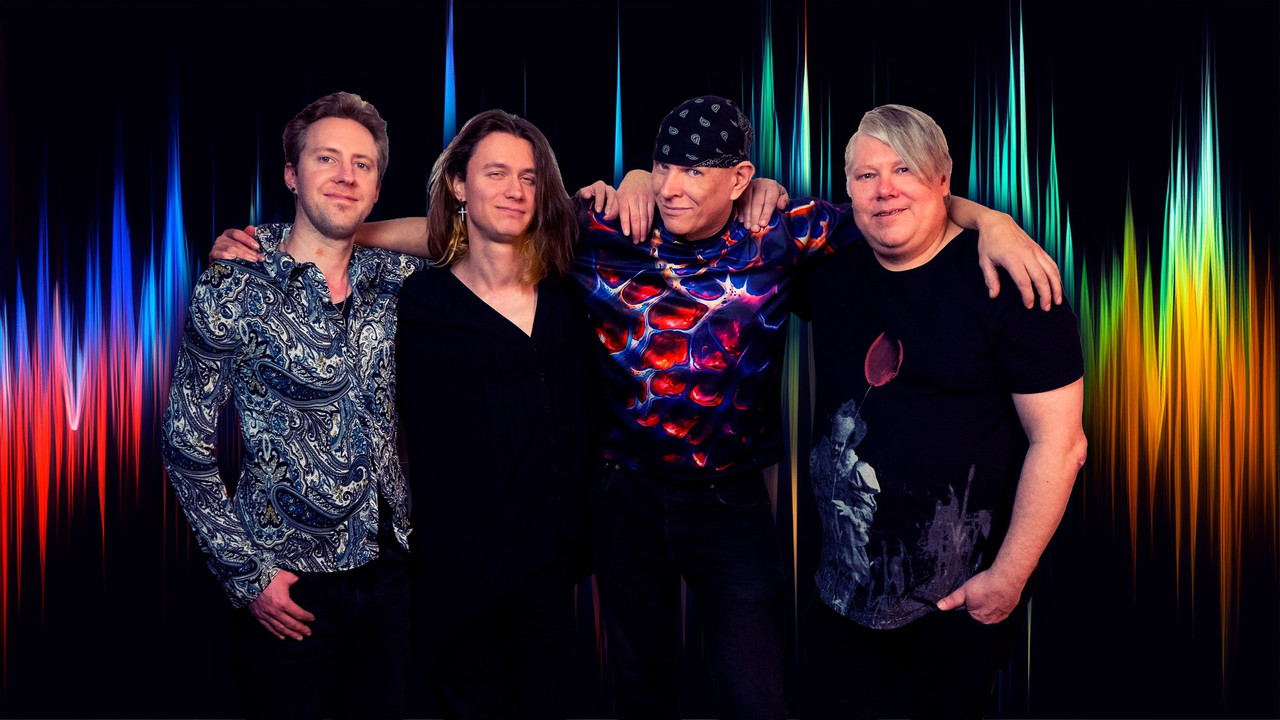
www.facebook.com/darknessismycanvas
From: Finland
Sounds like: Rock
1. How did you get started with music and how did you develop your sound? Who thought of the name "Darkness Is My Canvas" and is there any meaning behind it?
Initially, guitarist-producer Panu and singer Pete founded the band. Panu had produced music for numerous rock and metal bands before ours. Pete had been a singer and bassist in the Finnish rock scene before meeting Panu until he wanted to pursue a solo career. It was just a matter of finding the right studio. Pete had just bought a new Finnish progressive rock album. "This is great stuff, who produced this?" The album cover read "Panu." A phone call: “Hello, this is Pete. I want you to produce me an album. OK! Can I have creative freedom? Yes! You get free hands!.”
Soon, Panu and Pete realized they shared similar thoughts about music on many levels and decided to form a band together. So, the solo album turned into a band, and that's the path we're still on. The band has changed its name, language, and lineup, resembling the Spinal Tap movie: besides Panu and Pete, there have been a total of five drummers and five bassists since 2017. The changes haven't involved any major drama; values, attitude, or life situations haven't just made perfect matches.
In essence, our sound has emerged from the burning desire of two people to create meaningful music. The live sound, on the other hand, comes from the personality of each member. Although we have a well-defined path for the songs live, each of us has the freedom to bring our own twist through our instruments. The starting point is, of course, respecting the composition, but live arrangements leave room for improvisation. The sound of recordings and songs largely comes from using the studio as an instrument among others. We measure all our expertise in each song in some way during the production phase. Perhaps our madness is evident in using the term "extended mixing," which practically means that if we are not satisfied with a song, we may delete all audio tracks and start over. Time-consuming, yes, but the end result matters, not whether it took a week, two, or half a year to create the song.
The background of the band's name is a YouTube video Pete saw, where an artist painted long-exposure light paintings and patterns, leading to the realization that darkness is our canvas when light is the brush. Songs often go into deep waters, and with the lyrics, we aim to tell authentic stories of people we know, people whose lives have various pain points—life, fundamentally, can be quite challenging. Nevertheless, we try to find some light or hope in the lyrics.
Panu's vision of the guitar sound and the overall sound of the album stems from countless influences: '60s psychedelic rock, '70s progressive rock, '80s heavy metal, '90s grunge, and modern rock & metal. In addition, he has studied fusion, odd time signatures, and gone through blues, among other things. Influential guitarists for Panu include Steve Vai, Jeff Beck, Al Di Meola, Ritchie Blackmore, Jimi Hendrix, Brian May, and David Gilmour. Of current guitarists, Tim Henson has reached the level of those legends in Panu's opinion. However, when producing Darkness Is My Canvas, Panu doesn't approach the songs as a guitarist but as a holistic creator of sound together with Pete.
Pete, on the other hand, has sung in various bands, from punk and metal to soft rock, although his primary instrument is still the bass. Vocalization, breathing techniques, and how different singers shape their voices have been thoroughly examined, guided and self-taught. Ultimately, the most important thing for a singer is to find their own style and area where their voice sounds best. Often, the singer's best vocal range is in the discomfort zone, which becomes a new comfort zone. The biggest challenge for a singer is that their mental state significantly affects their voice, so one has to be quite zen with everything to give their best in the studio and on stage.
2. What do you want people to take away from your music?
We hope people feel that we are telling a story that our music complements, and vice versa. As a second strength, we believe we have massively great and catchy melodies—ones that keep playing in your head repeatedly. And, as we are somewhat perfectionists, the songs have many layers, so you can discover new elements when listening again and again. Good quality, surprising, and meaningful music, that's what we are.
3. How would you describe your sound to the average listener?
We are organic, melodic, guitar-driven rock with influences from metal, progressive rock, alt rock, indie rock, 80’s synth pop, and even fusion. We lightly jump from one genre to another, but Pete's vocal and Panu's crafted melodies are the elements that tie the package together, glued into a whole by our rhythmic duo, Juza and Fellu. At gigs, people always say, "Whatever the style of the song, you can immediately recognize that it's Darkness Is My Canvas!"
4. Who are three bands you’d like to tour with?
Muse, although they don't need support bands...
Leprous, anytime, anywhere.
Ghost.
5. How has Covid affected what you do?
It did affect quite a bit—we had just gotten the band into gig shape at the beginning of the pandemic and managed to play exactly ONE show, and then everything closed down. "No can do," we thought, and locked ourselves in the recording studio to bake new songs. Eventually, that path turned out to be the right one for us because we were in a creative and quite frustrated mood, resulting in creating enough new songs for two EPs. It was incredibly frustrating to witness the death of the music industry during the pandemic. People, especially decision-makers, still don't seem to understand that the majority of musicians and artists are small business owners or freelancers with no safety net. When venues reopened, we celebrated it with a long "After the Silence" tour in 2022-2023 in Finland. After the pause, playing live to people felt really bewildering, and it felt a bit like we had never faced people face-to-face.
6. What’s your take on the current state of Rock?
Good music is being made all the time, but commercially successful bands are not the most interesting. As musicians, we don't get excited about the same guitar sounds used a million times by every rock/metal band. Also, fixing all playing nuances to the grid gets tiresome—many bands would sound better if they dared to leave more life in their playing during the production phase. To borrow from Boomer-aged individuals: "rock used to have speed and danger; now it's industrially produced plastic." Of course, this is just the shouting of an indie band from the sidelines, and we would gladly accept a reasonable salary for our music.
7. What's the current music scene like there in Finland?
TOP40 is filled with stuff from big record label production machines. Domestic rap music is incredibly successful, with many individual solo artists. In practice, so-called rock music is very scarce on the charts, and if it is, the artists succeeding with rock or metal music have been in the industry for a long time with a wide fan base. In the underground or indie scene in Finland, there are really many good rock bands and excellent artists, but opportunities in the spotlight are very few, so new bands are rarely found there. Of course, we are delighted to have had the opportunity to perform with excellent Finnish bands, such as Daiba Cowboys, Miss Vain, Sina Viola, DOL, Burning Cities, Royalen, and Revolute61. Perhaps this could be summarized as follows: we are really concerned about rock music— the metal scene is doing fine, but UG rock and indie rock are dying a bit. However, on the flip side, some excellent artists have made it to the mainstream, such as The Holy, Arppa, Maustetytöt, to name a few.
8. What’s your take on the royalties that streaming services pay out to artists?
Major platforms pay ridiculously little to small bands. It's unfair that, for example, on Spotify, the biggest artists get a larger percentage per play than smaller ones. If you're not at the top of the charts, dreaming of making a living from royalties is futile, even if you accumulate a nice number of streams. On the other hand, we realize that people in the digital age are used to everything being free or almost free. This negatively impacts the number of subscribers to streaming services and, consequently, the size of the cake shared among artists. Streaming revenues are really low for indie artists compared to the time when albums were sold hand to hand. Of course, the flip side is that it has never been easier to find indie rock and discover new bands. An indie artist should never think of Spotify and similar platforms as a source of income but should treat them like you would treat social media—gather people around your music and perform a lot. That's the way. Perhaps. Once in a blue moon.
9. What's next for Darkness Is My Canvas?
We'll be playing gigs sporadically during the winter, allowing us time to focus on composing and recording an EP. If enough songs come together, we might release a full-length album. We are excited about the new songs—some seriously powerful stuff is coming!!! If we make a full-length, it will again be a nightmare for genre police; we'll be exploring all the genre boxes in Western music—from electro to the depths of symphonic metal. During the fall and early winter of 2023, our live lineup has honed its skills to a high level, and we now sound like a stadium-class band. It will be fantastic to present new material at upcoming gigs!
10. Any shoutouts?
People! Support rising bands! Buy merchandise, listen to songs, attend gigs (and watch gigs with wide-angle, not staring at your phone video recorder), spread the word to friends. Find out about artists outside the TOP40!

